How Well Does the Terramaster F4-423 NAS Perform as a Plex Media Server?
Of all the brands that I discuss here on NASCompares, very few have evolved with the speed that Terramaster has. Although coming up on a decade in the commercial network attached storage industry, they have managed to carve an impressively sized portion of the more cost-effective NAS buyer market. These days, it is very easy to find Terramaster NAS systems that are arriving with similar hardware to their big rivals Synology and QNAP, but with a price point some 15-20% less. Now QNAP and Synology trade on both their hardware AND their hardware, the latter of which has always been Terramaster’s weakness (though they are improving things a great deal in TOS 5). However, for buyers looking at Terramaster NAS for use with 3rd party software such as Plex Media Server, this means that they have the opportunity to get quite a bargain with a NAS like the new F4-423. The appeal of accessing all the movies, boxsets, music and home movies that you physically/digitally own in the style popularized by Netflix, Disney+ and Prime Video (flashy GUI, summary, all the box art, trailers, cast details, reviews and more) is undeniable. The rise in popularity of streaming platforms like Netflix has also been accompanied by rising monthly subscription costs and rising concerns about never truly owning the media that you want o watch. Even when you buy movies and TV boxsets in digital download forms from Amazon Video etc, you are still at the mercy of 1) needing somewhere to store it if you do choose to download it and 2) potentially losing access to it if the site/platform you purchased from has lost the license to host it (a common complain of the increasingly digital world of PC/Console gaming, as games are pulled from eStores). Hosting your media in a subscription-free form, whilst it still being presented in the universally accessible and premium GUI form of Plex is one of the most compelling reasons for many home/prosumer users deciding to make the jump towards buying their own plex media server. However, NAS drives have grown incredibly diverse in terms of hardware design and therefore one NAS might not play media in plex as well/efficiently as another – and the Terramaster F4-423 NAS is no exception to this. Today I want to detail my tests of the F4-423 as a Plex Media Server and I hope this will help you decide whether a Terramaster NAS deserves your Multimedia in 2022/2023.
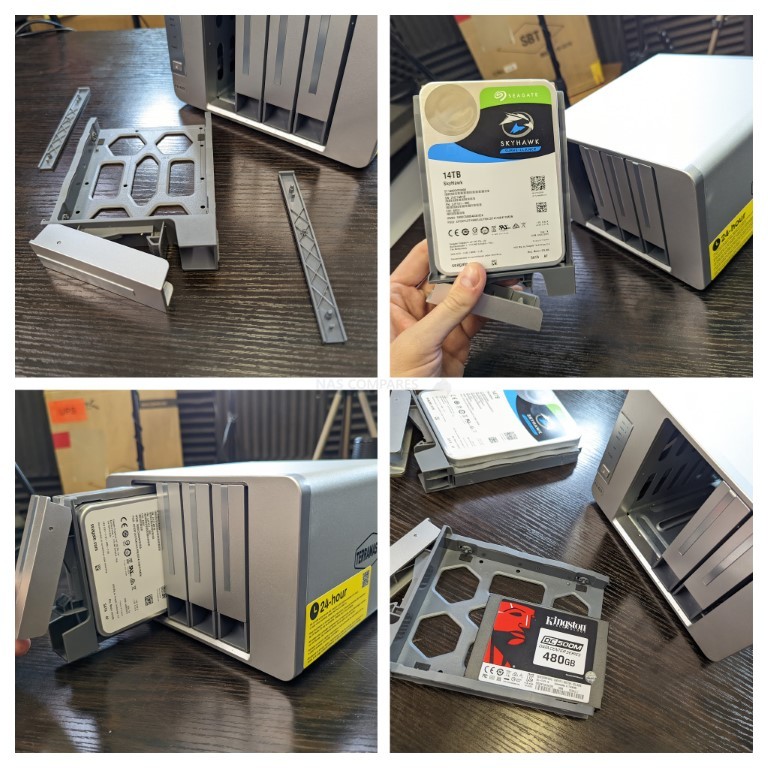
What is the Hardware of the Terramaster F4-423 NAS Drive?

The Terramaster F4-423 NAS drive is quite similar in architecture to most PCs or Laptops (in that it features a CPU+Memory+Storage), but differs in that it’s components are designed to be more efficient (as they will be in operation 24×7) and have a larger degree of focus on storage-related applications (whereas the hardware in a PC/Laptop is designed more for the applications you run with storage service concerns/provisions being far more rudimentary). The F4-423 is made up of a popular mid-range server CPU, DDR4 memory and supports Hard Drive and SSDs in SATA. although most of the specifications of Terramaster NAS drives are unrelated to Plex, below I have picked up the hardware specifications of the F4-423 that are relevant to Plex:
- CPU: Intel N5105 Celeron CPU, Quad-Core, 4 Thread, 2.0-2.9Ghz Processor
- Embedded Graphics: Yes
- Memory (Quantity & Maximum): 4-32GB Max
- Number of Storage Bays: 4x SATA Bays
- M.2 NVMe Caching Bays: Yes, 2x M.2 NVMe 3×1
- Network Connectivity: 2x 2.5GbE
Next, let’s quickly touch on how we measure how good/bad the Terramaster F4-423 NAS is for Plex Media Server.
Understanding the Plex Media Server Tests of the Terramaster F4-423 NAS
![]()
Important Terms to Understand in Plex/NAS/Multimedia that will make the F4-423 NAS Plex Tests Easier to Understand.
- SD, 160p, 240p, 480p, 720p, 1080p, 4K : This is the resolution that the media is being displayed at. The higher the resolution, the larger number of pixels that are available and depending on the original recording quality of the media in question. High resolutions, such as 1080p and 4K require more work to be done by the NAS hardware in order to playback the file. More often than not, a NAS with weak embedded graphics or no embedded graphics at all will be unable to play 4K very well or indeed at all. It is important to remember that just because a NAS brand like Terramaster says that their latest NAS can natively play back 1080p or 4K media (natively = played using their own NAS software, software client tools and/or DLNA), that does not mean that the F4-423 will play to the same standard in Plex, as Plex is a 3rd party tool
- Transcoding, Encoding, Decoding : These are all different techniques/names for when a file needs to be changed in order to be better suited to the connected client device connection, strength or hardware. If you are accessing all your media on the local area network (i.e only accessing your plex media at home), then transcoding will rarely be something you will use (unless your media is largely H.265/HEVC based, see earlier). However, perhaps you are accessing your plex library on the train to work or from a sun bed whilst on holiday. Perhaps you have a smaller data bandwidth/allowed MB/GB, maybe a weaker internet connection, perhaps you are using a smaller phone device and you might not need to watch your 4K 50GB Blu-ray rip of the latest Marvel Movie – in these situations, you might well want to access the media on your Terramaster F4-423 Plex NAS at a lesser quality than the original version, so transcoding/re-encoding on the fly (as in, at the same time it is being played) is what you would want to do. Remember, transcoding is by far the most heavy-weight thing you will need to do on a NAS. It is also worth remembering that in order for Plex o be able to use the FULL resources of a NAS CPU (such as embedded graphics) that you will need to enable ‘Make My CPU Hurt’ in the Encoder Menu of the Plex NAS Settings menu – this also potentially requires a Plex Pass subscription, depending on the NAS in question
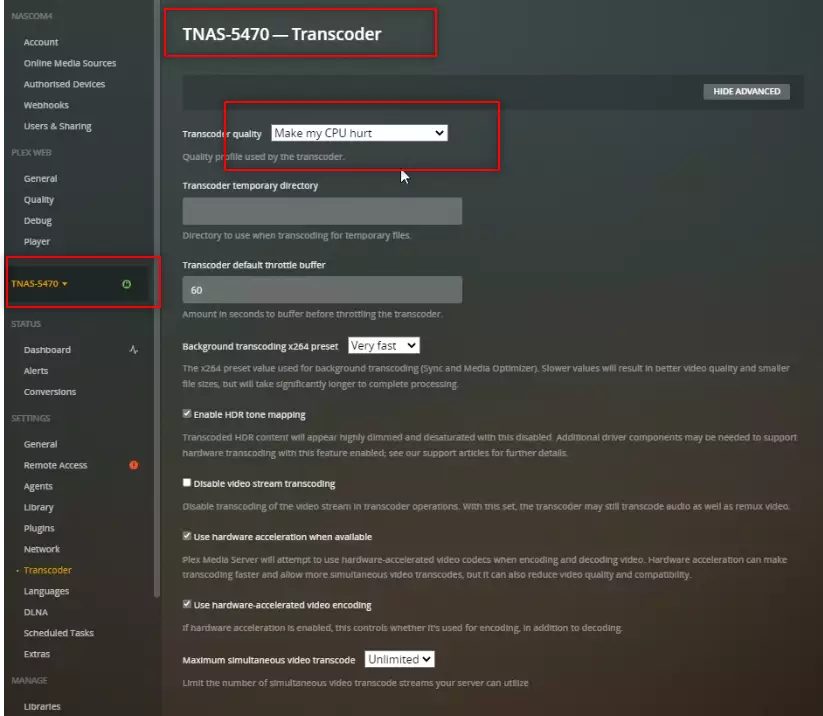
- H.264, HEVC, H.265 : These are compression techniques that are designed to allow large-scale media presentations that were made for a cinema to be viewable from your sofa (with H.265 being the more effective/powerful compression level). H.264 can largely be played by ALL devices, but many devices do not have permission or a license to play H.265/HEVC (they are the same thing). This is because, where H.264 is an easy license and comparatively free to use, H.265/HEVC licencing and patents are spread across multiple providers and allowing a device license to use this compression technique can be complex, expensive or simply impossible. Therefore HEVC/H.265 media will sometimes AUTOMATICALLY need to be converted/transcoded into H.264 etc in order to be played – therefore eating up more system resources. The F4-423, much like the rest of thte Terramaster NAS range do not arrive with HEVC support by default
- Bitrate : Bitrate is the amount of data encoded for a unit of time, and for streaming is usually referenced in megabits per second (Mbps) for video, and in kilobits per second (kbps) for audio. Higher quality and higher resolution media tends to be of a much higher bitrate
For more information on the most important terms to understand when discussing/researching a NAS as a Plex Media Server can be found in my video below:
Any further questions, you can use the free advice section at the bottom of the page and ask me and Eddie directly.
How was the Terramaster F4-423 NAS Tested in Plex?
The setup for testing the F4-423 NAS for Plex was as follows:
- The Terramaster F4-423 NAS was accessed over a 1GbE network, however in order to test how the NAS would cope with transcoding/encoding, I would force the Plex Player client to transcode the file manually
- The F4-423 NAS was used in the default CPU+Memory state that the base model arrives in (no upgraded memory or upgraded caching media)
- Tests were performed one after the other with a short break between each test, so you might see the tail end of the previous test on a CPU graph, but I have pointed at the are of the % utilization that is important as per each test
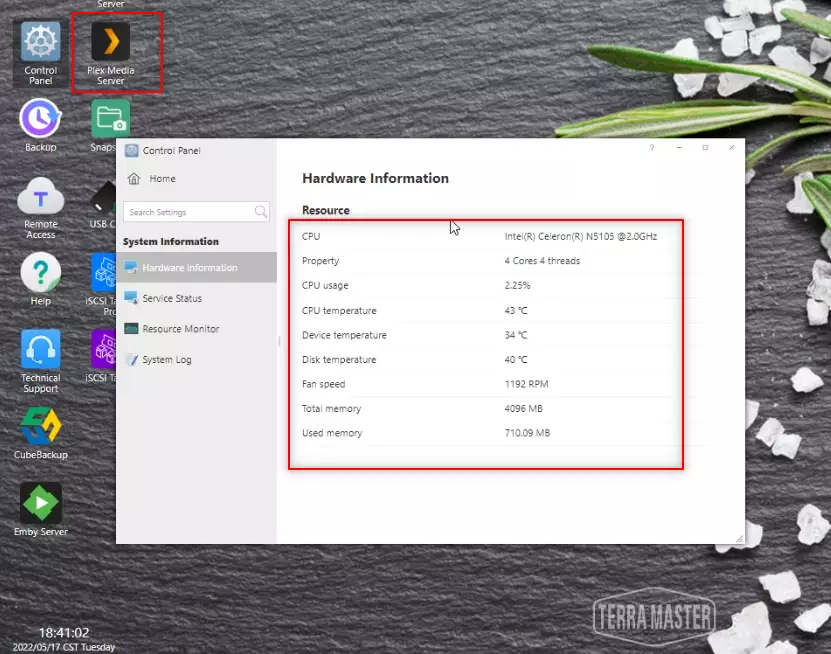
Regarding test results, CLEAR PASS means that the file successfully played and there were sufficient resources for the NAS to continue to do other things comfortably, PLAYED BUT HIGH CPU % means that the file played, but it utilized a significant amount of system resources in order to do so in a heavier use situation (i.e other NAS users connected) it might not play and FAIL AND-OR DID NOT PLAY means that the file either did not play or the time taken to play back the files was outpaced by the natural playback of the file – i.e. the file would stop-and-start constantly in order to try and catch up. If you want to watch the FULL video recording of all the Plex tests that I performed on the Terramaster F4-423 NAS, you can watch the video below. Be warned, it is quite long! Alternatively, you can scroll past and see each of the test results, one-by-one, detailing which ones worked and which ones didn’t:
What % System Resources did the Terramaster F4-423 NAS Use in Plex when Idle?
Running the Plex Media Server application, even when no multimedia is being played on the F4-423 is still going to require a % of system resources to be occupied, in order to ensure that PLEX can play media from the Terramaster NAS as soon as it is requested remotely. Additionally, although Plex runs at its best with at least 2 Cores of CPU power and 2GB of Memory, many NAS also reserve areas of CPU/RAM for the system itself. So, therefore, knowing how much system resources are being consumed by the Terramaster F4-423 NAS when Plex is idle is going to be useful to know how much system power is available when playback actually starts. Here is a screenshot of the F4-423 when Plex is running, but no media is being played/accessed:
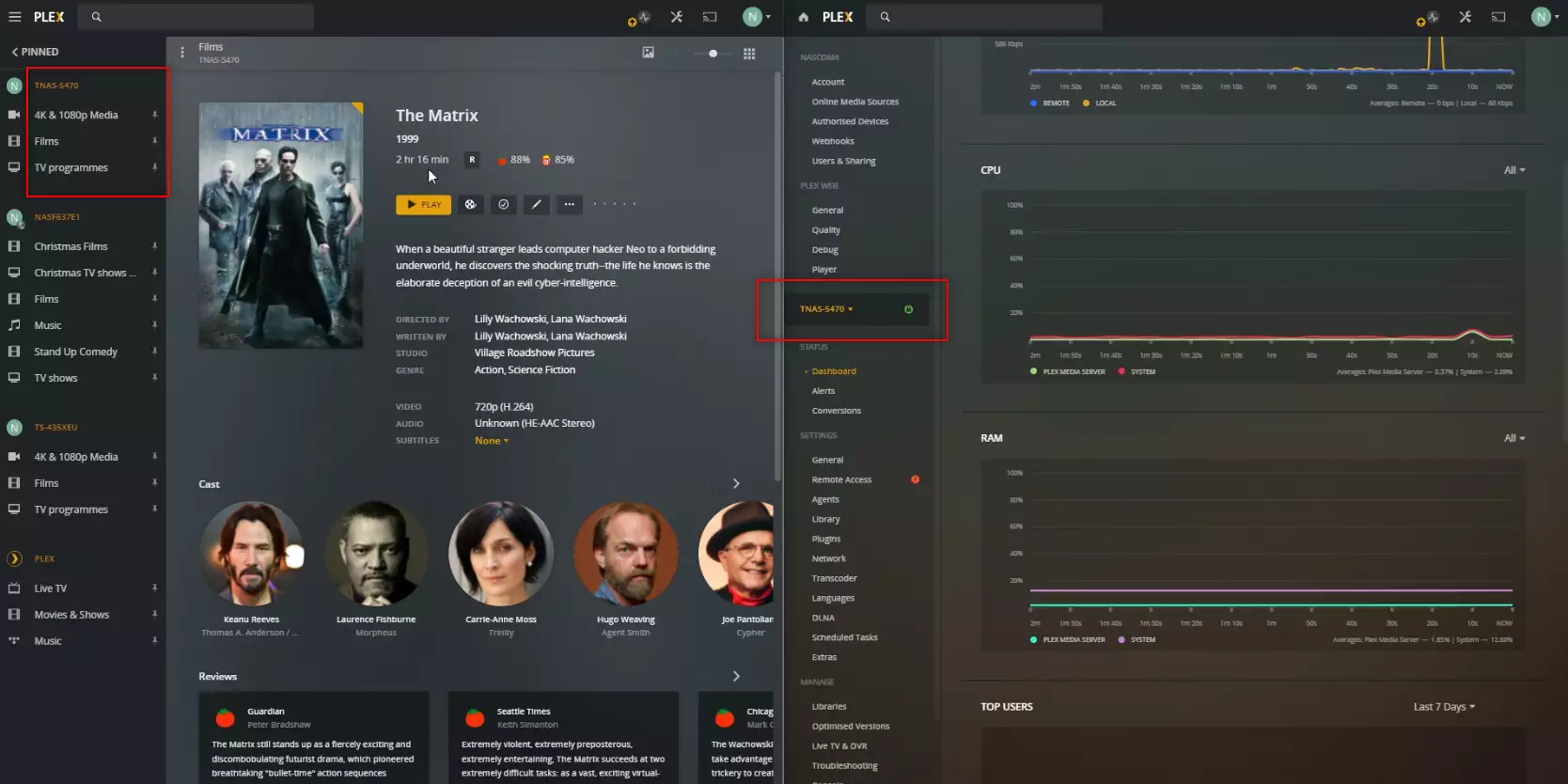
Plex Test 1 – TERRAMASTER F4-423 Plex NAS – Matrix 720p 0.7Mbps h.264 Original PlaybackTERRAMASTER F4-423 Plex NAS – Matrix 720p 0.7Mbps h.264 Original Playback
Here is how the TERRAMASTER F4-423 Plex NAS – Matrix 720p 0.7Mbps h.264 Original Playback File Performed:
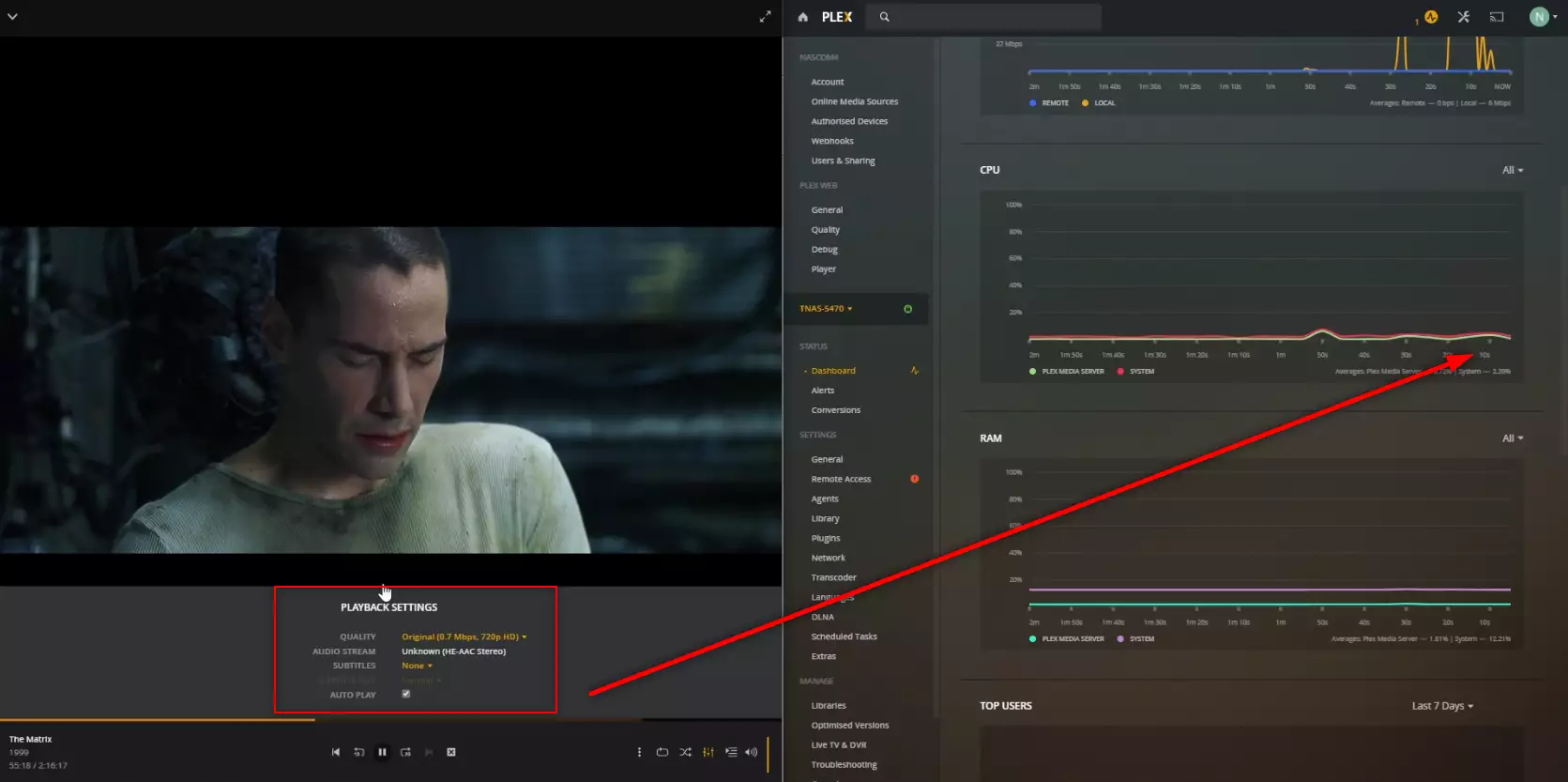
RESULT: CLEAR PASS
Extra Notes: None
Plex Test 2 – TERRAMASTER F4-423 Plex NAS – Matrix 720p 0.7Mbps h.264 TRANSCODE TO 240p
Here is how the TERRAMASTER F4-423 Plex NAS – Matrix 720p 0.7Mbps h.264 TRANSCODE TO 240p File Performed:
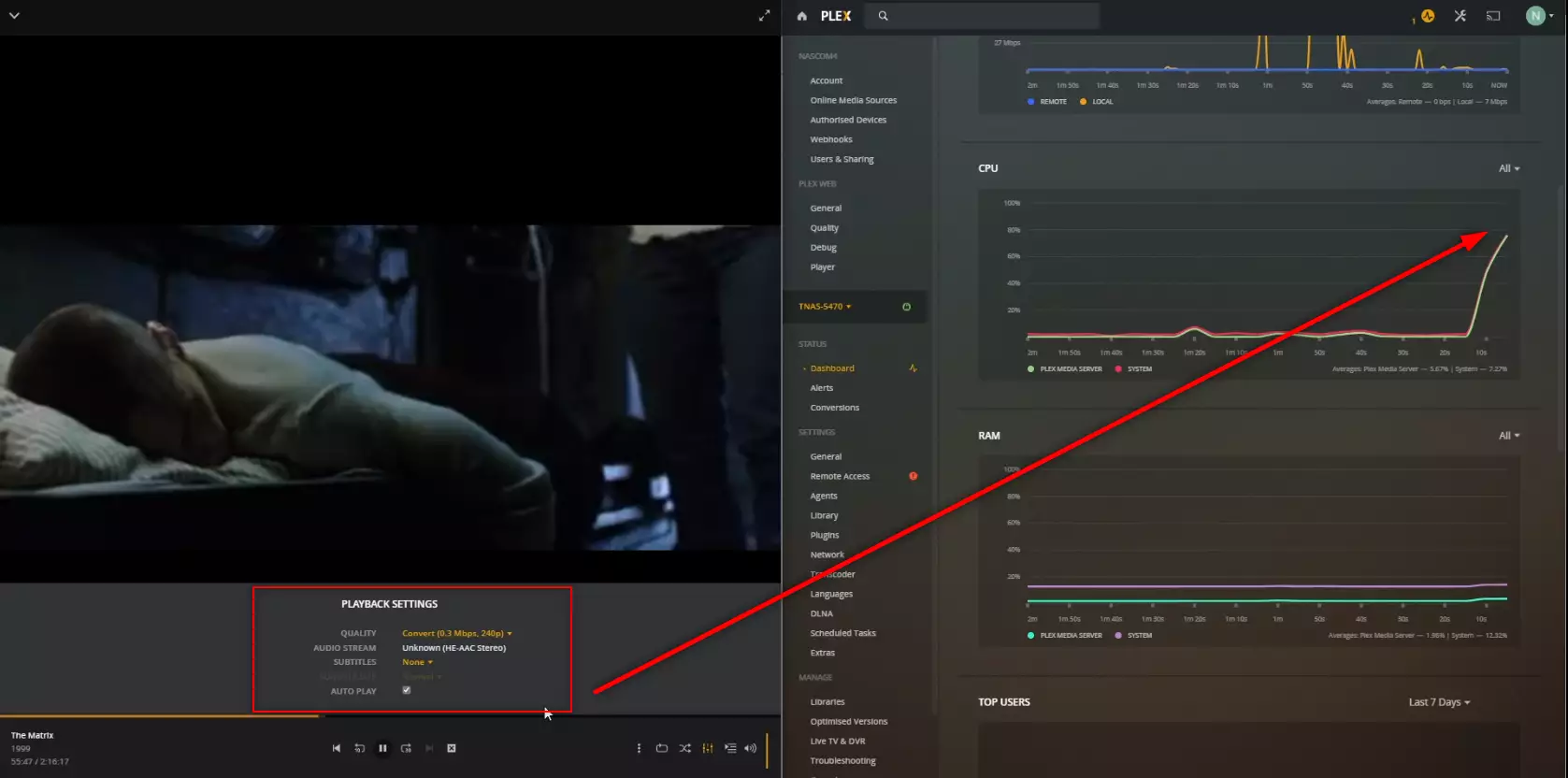
RESULT: PLAYED BUT HIGH CPU %
Extra Notes: None
Plex Test 3 – TERRAMASTER F4-423 Plex NAS – LSOH 1080p 1.9Mbps h.264 Original Playback
Here is how the TERRAMASTER F4-423 Plex NAS – LSOH 1080p 1.9Mbps h.264 Original Playback File Performed:
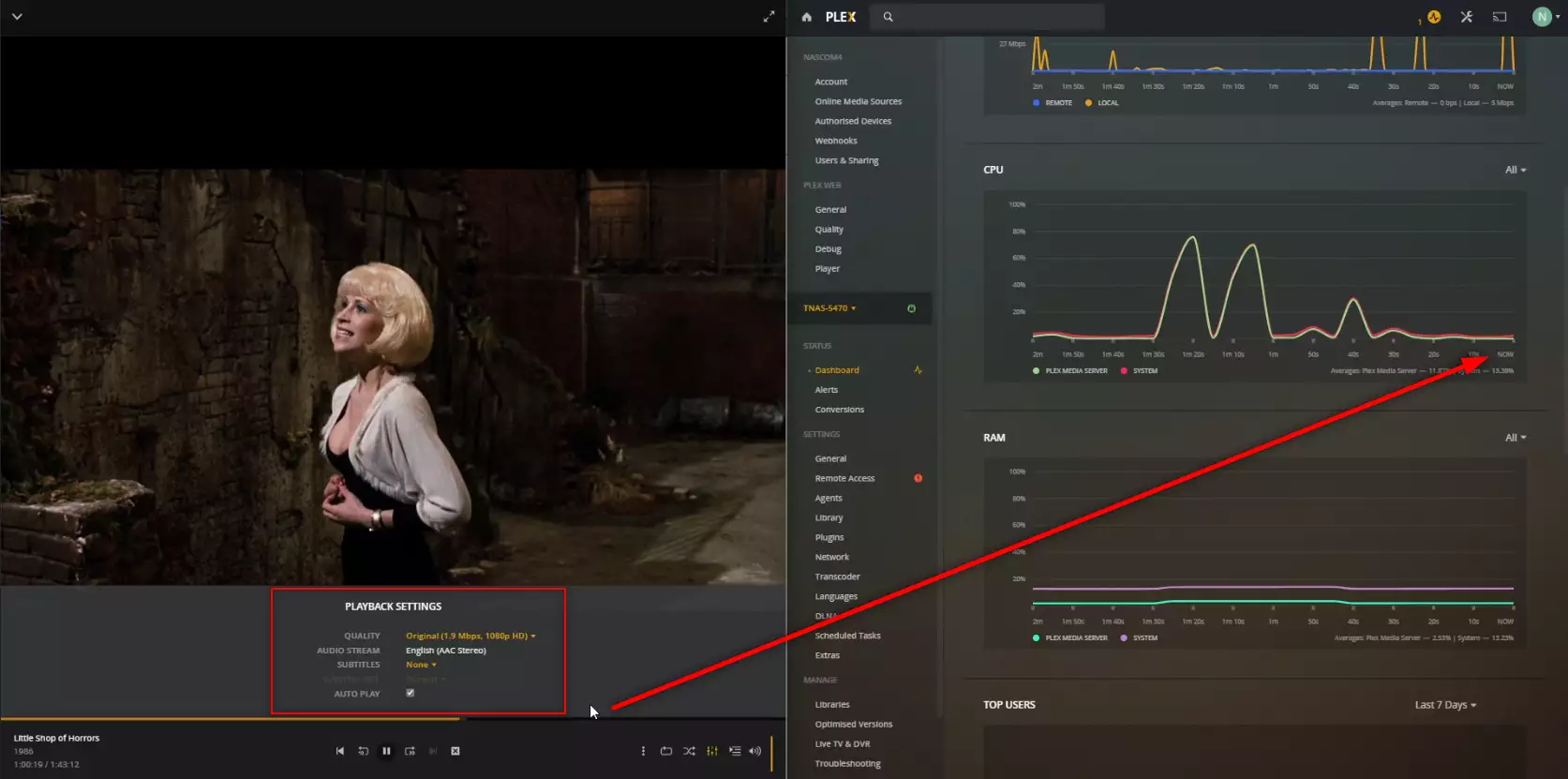
RESULT: CLEAR PASS
Extra Notes: None
Plex Test 4 – TERRAMASTER F4-423 Plex NAS – LSOH 1080p 1.9Mbps h.264 Transcode to 720p 2Mbps
Here is how the TERRAMASTER F4-423 Plex NAS – LSOH 1080p 1.9Mbps h.264 Transcode to 720p 2Mbps File Performed:
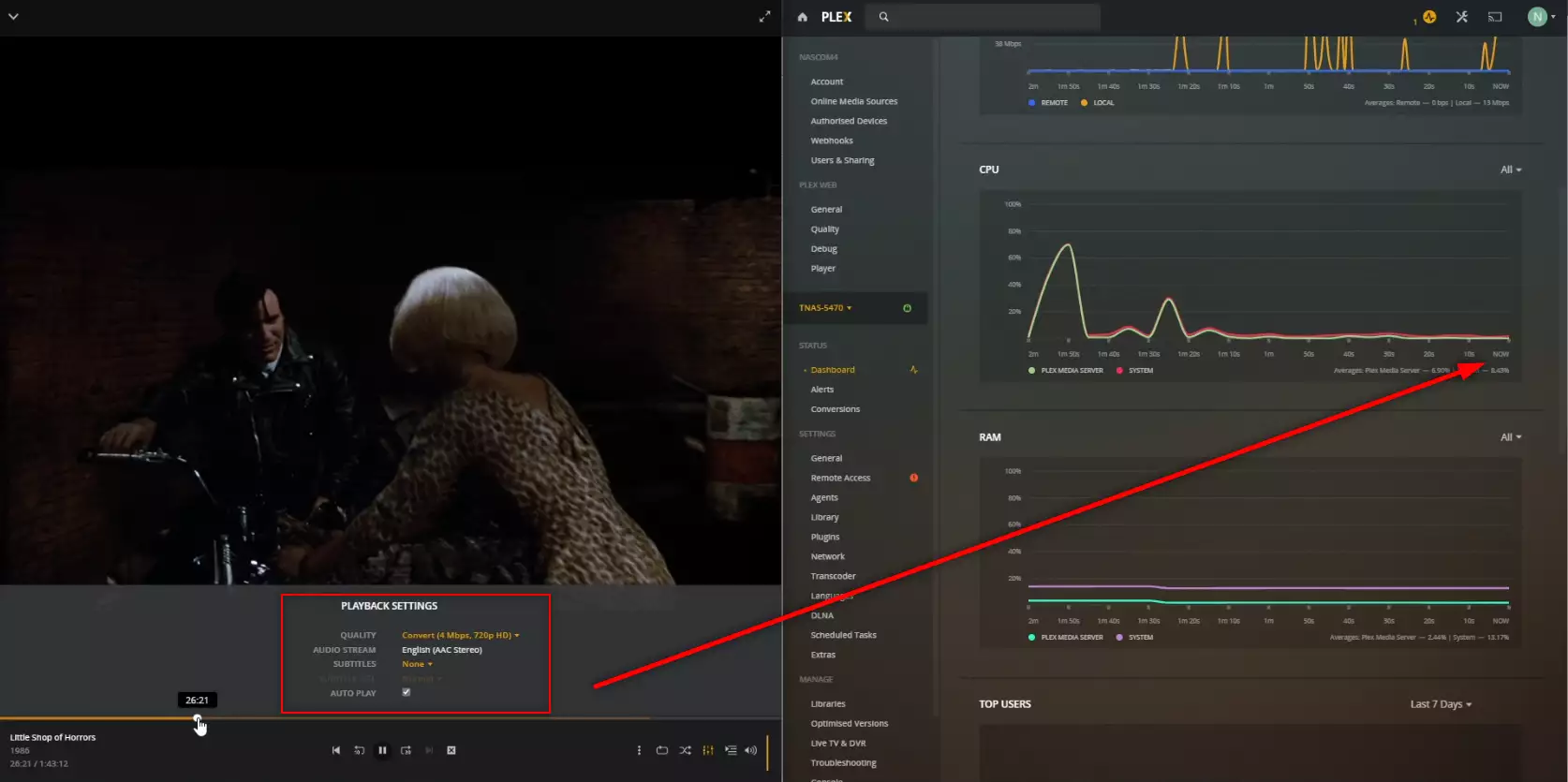
RESULT: CLEAR PASS
Extra Notes: None
Plex Test 5 – TERRAMASTER F4-423 Plex NAS – LSOH 1080p 1.9Mbps h.264 Transcode to 240p 0.3Mbps
Here is how the TERRAMASTER F4-423 Plex NAS – LSOH 1080p 1.9Mbps h.264 Transcode to 240p 0.3Mbps File Performed:
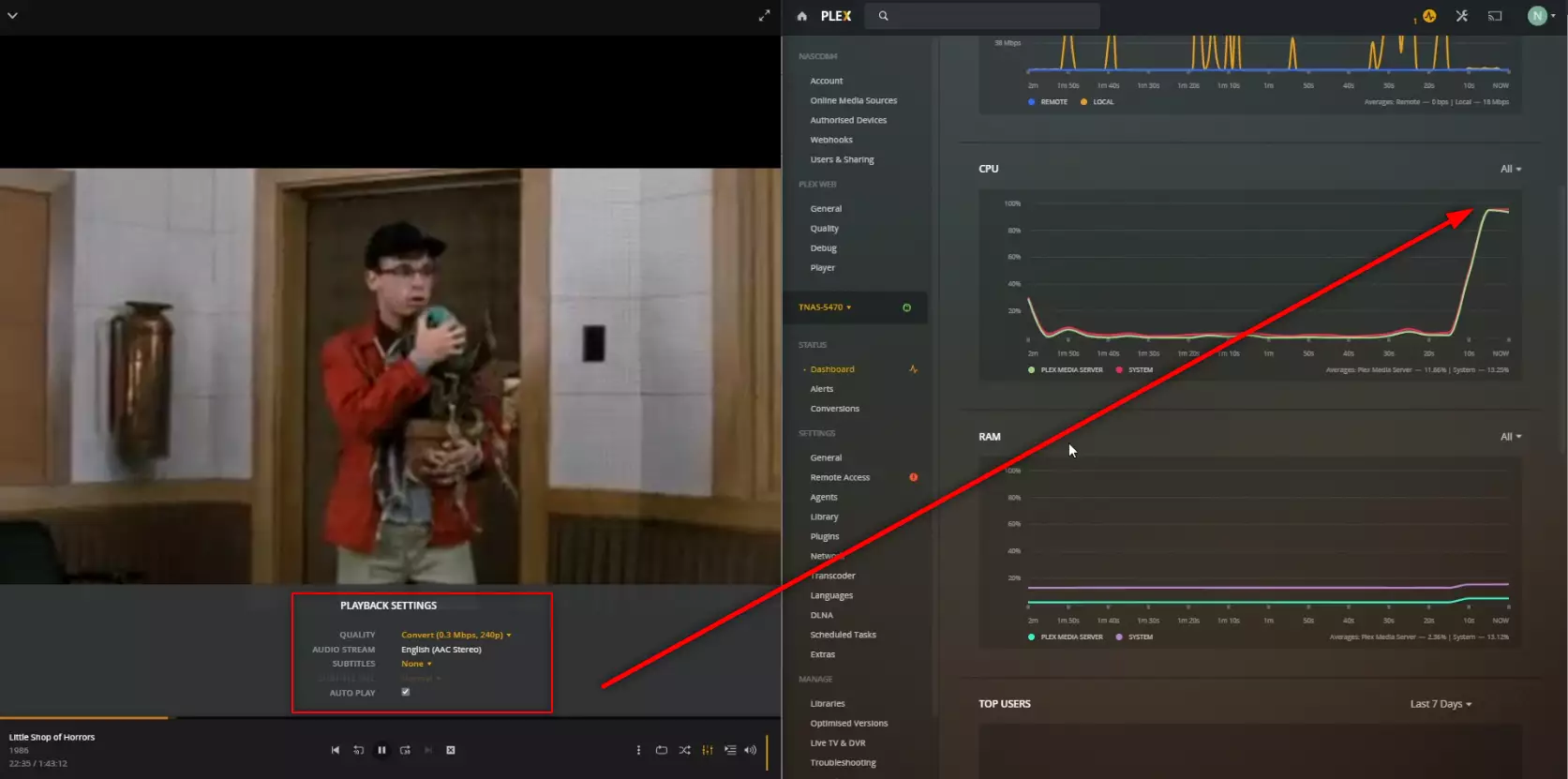
RESULT: PLAYED BUT HIGH CPU %
Extra Notes: None
Plex Test 6 – TERRAMASTER F4-423 Plex NAS – Jellyfish 1080p 3Mbps H.264 Original Playback
Here is how the TERRAMASTER F4-423 Plex NAS – Jellyfish 1080p 3Mbps H.264 Original Playback File Performed:
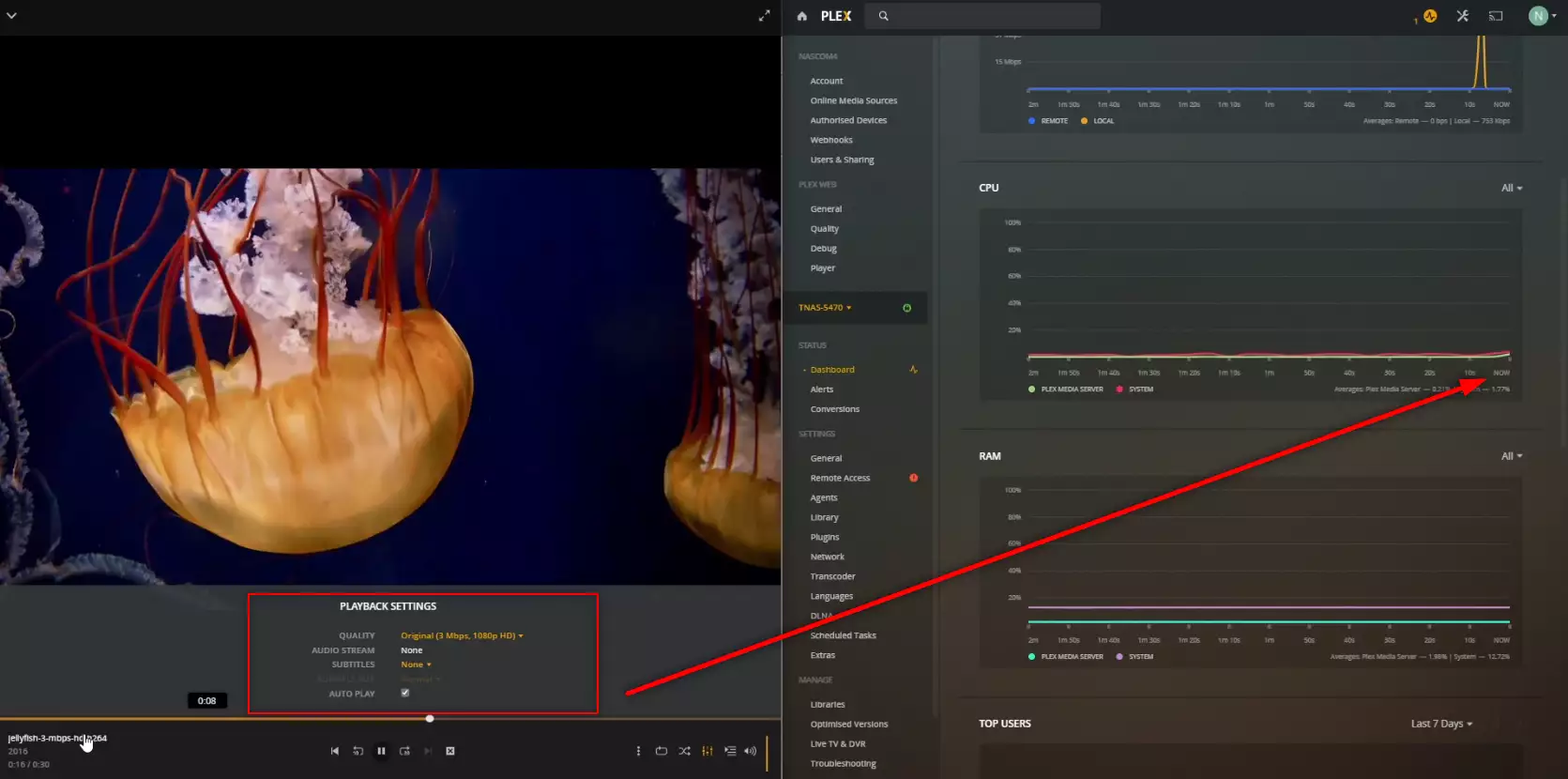
RESULT: CLEAR PASS
Extra Notes: None
Plex Test 7 – TERRAMASTER F4-423 Plex NAS – Jellyfish 1080p 3Mbps H.265 – HEVC CONVERTED TO H.264
Here is how the TERRAMASTER F4-423 Plex NAS – Jellyfish 1080p 3Mbps H.265 – HEVC CONVERTED TO H.264 File Performed:
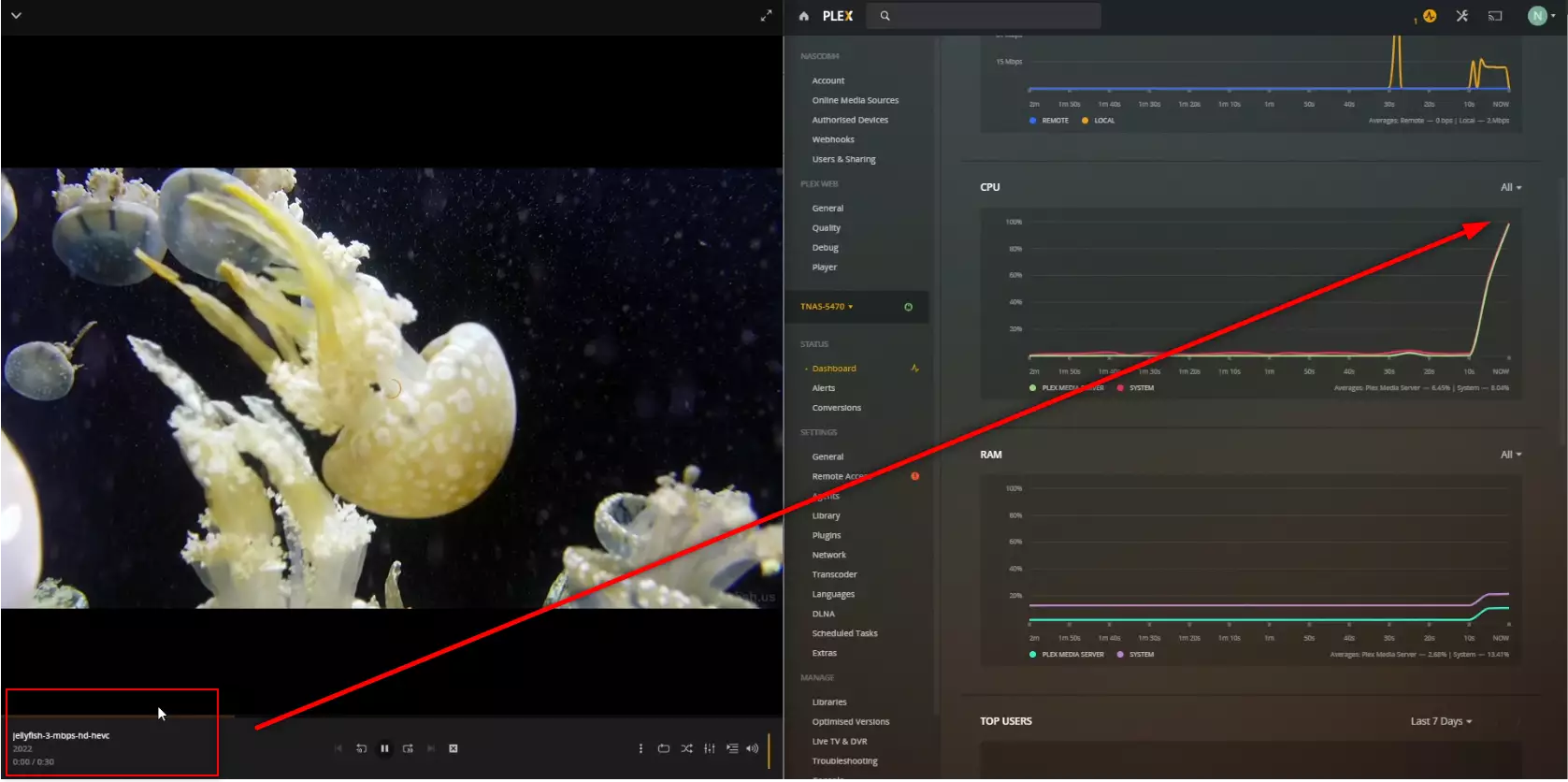
RESULT: PLAYED BUT HIGH CPU %
Extra Notes: None
Plex Test 8 – TERRAMASTER F4-423 Plex NAS – Jellyfish 1080p 3Mbps H.265 – HEVC 10BIT CONVERTED TO H.264
Here is how the TERRAMASTER F4-423 Plex NAS – Jellyfish 1080p 3Mbps H.265 – HEVC 10BIT CONVERTED TO H.264 File Performed:
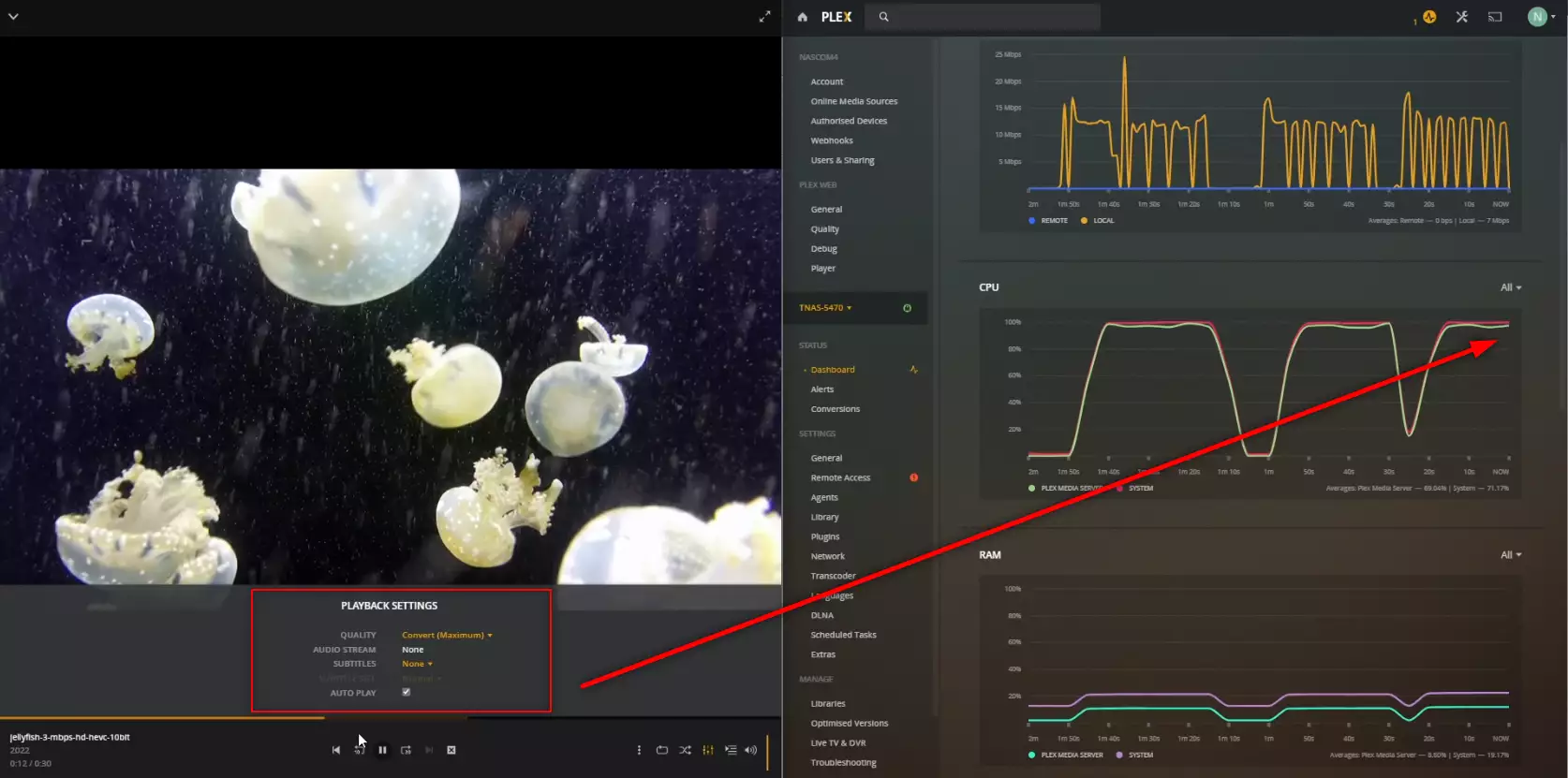
RESULT: PLAYED BUT HIGH CPU %
Extra Notes: None
Plex Test 9 – TERRAMASTER F4-423 Plex NAS – Jellyfish 1080p 10Mbps H.264 Original Playback
Here is how the TERRAMASTER F4-423 Plex NAS – Jellyfish 1080p 10Mbps H.264 Original Playback File Performed:
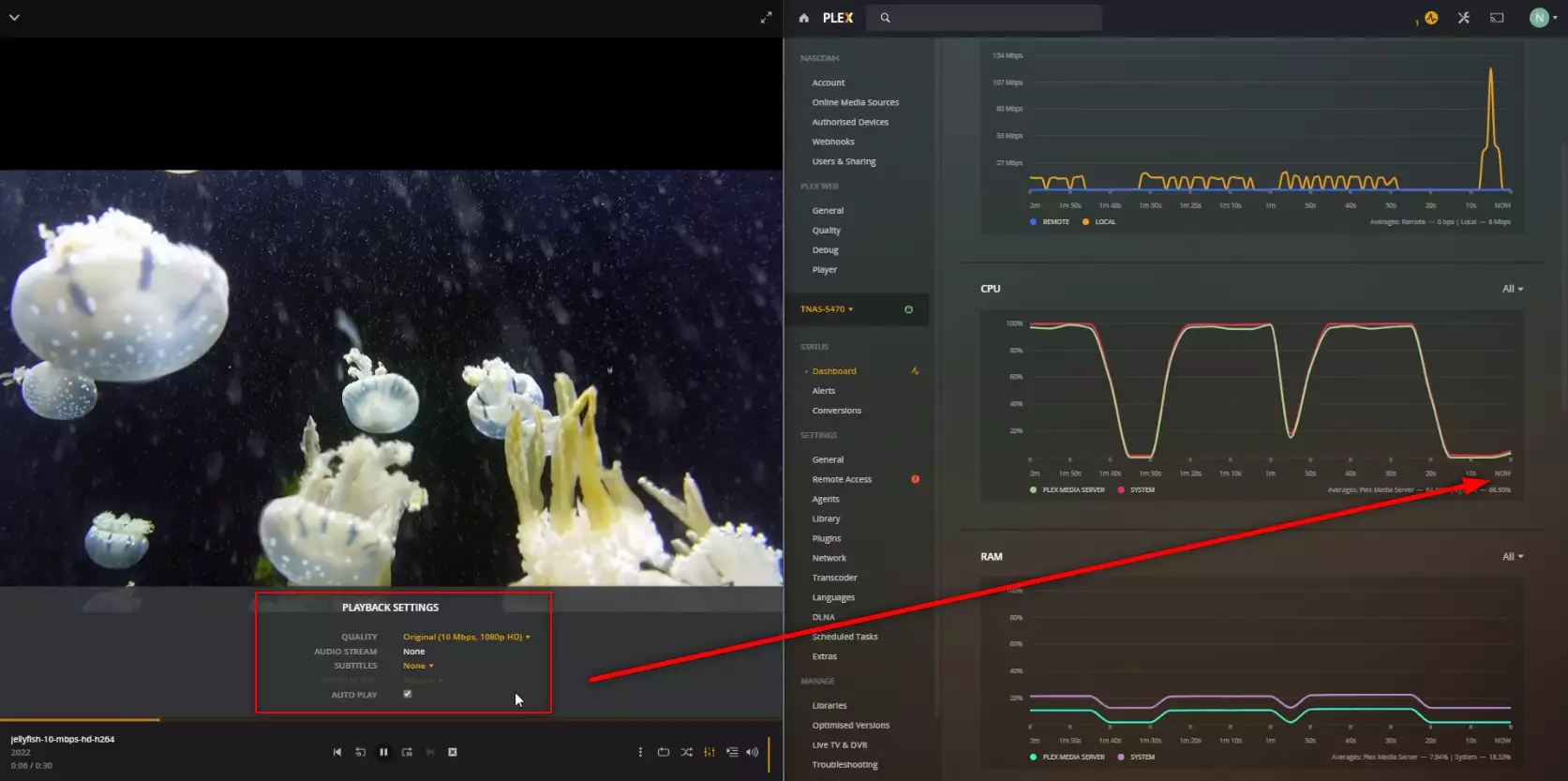
RESULT: CLEAR PASS
Extra Notes: None
Plex Test 10 – TERRAMASTER F4-423 Plex NAS – Jellyfish 1080p 10Mbps H.265 – HEVC CONVERTED TO H.264
Here is how the TERRAMASTER F4-423 Plex NAS – Jellyfish 1080p 10Mbps H.265 – HEVC CONVERTED TO H.264 File Performed:
RESULT: PLAYED BUT HIGH CPU %
Extra Notes: None
Plex Test 11 – TERRAMASTER F4-423 Plex NAS – Jellyfish 1080p 30Mbps H.265 – HEVC CONVERTED TO H.264
Here is how the TERRAMASTER F4-423 Plex NAS – Jellyfish 1080p 30Mbps H.265 – HEVC CONVERTED TO H.264 File Performed:
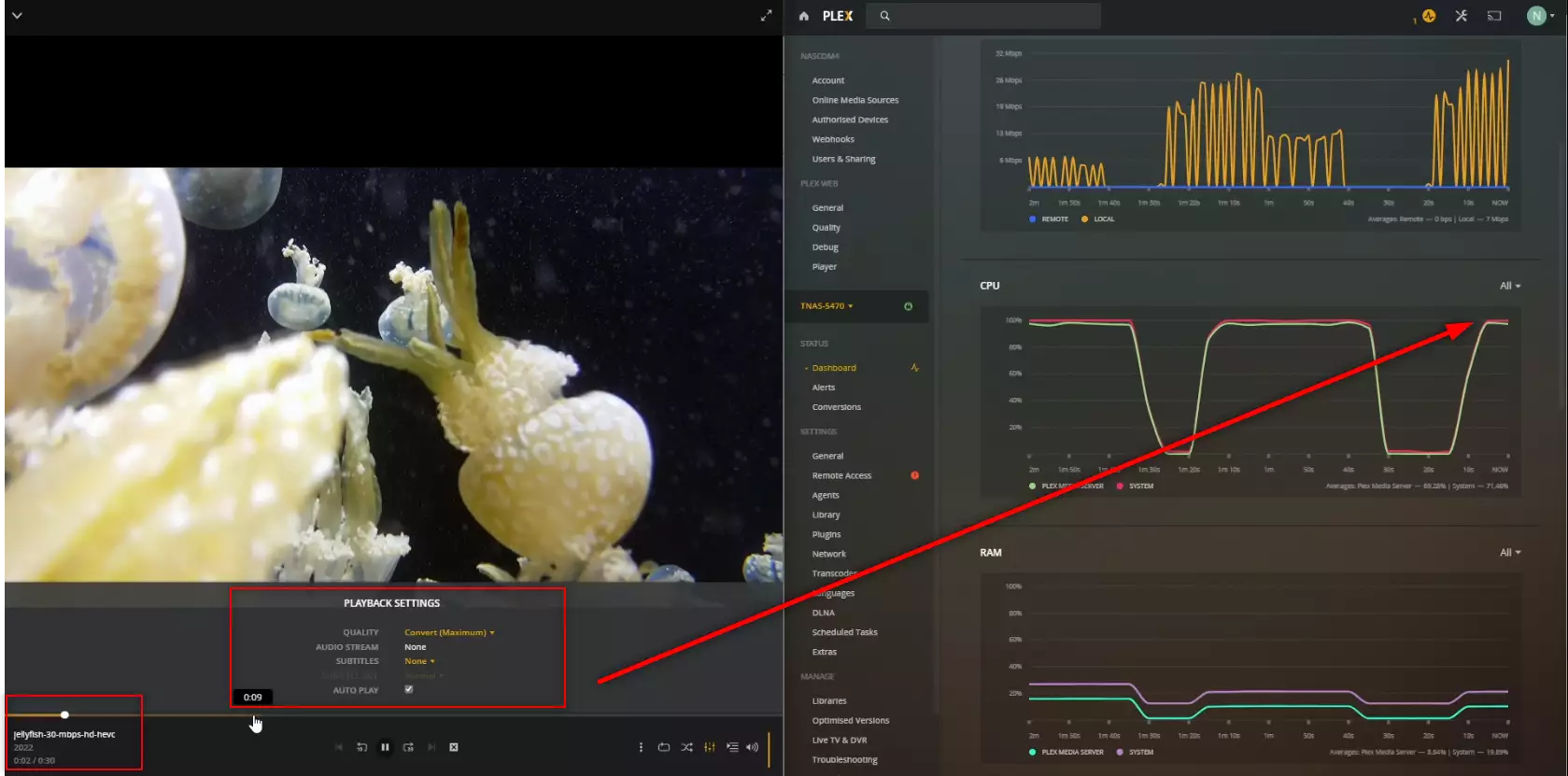
RESULT: FAIL AND-OR DID NOT PLAY
Extra Notes: None
Plex Test 12 – TERRAMASTER F4-423 Plex NAS – Jellyfish 1080p 100Mbps H.264 Original Playback
Here is how the TERRAMASTER F4-423 Plex NAS – Jellyfish 1080p 100Mbps H.264 Original Playback File Performed:
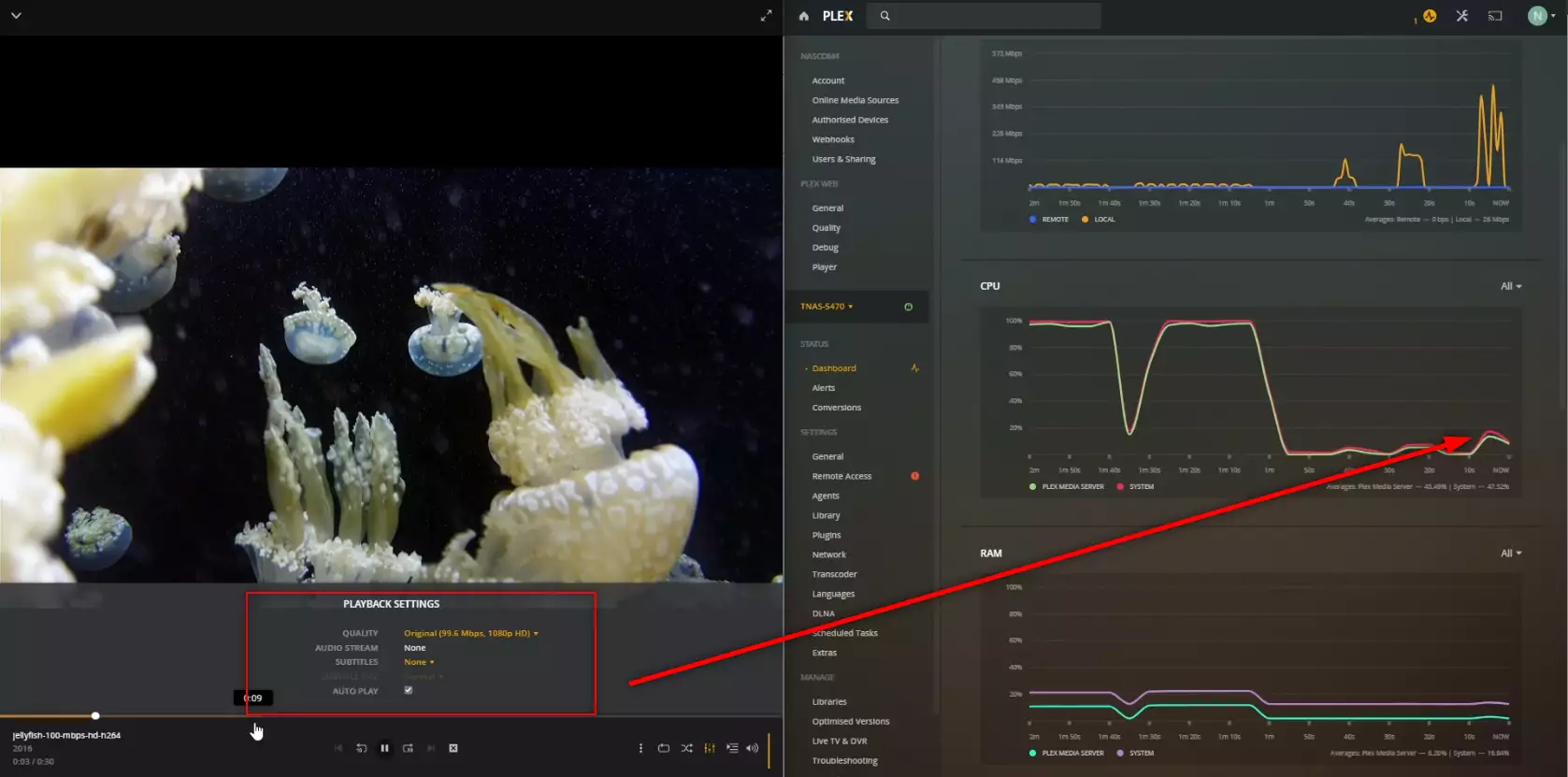
RESULT: CLEAR PASS
Extra Notes: None
Plex Test 13 – TERRAMASTER F4-423 Plex NAS – Jellyfish 4K 120Mbps H.264 Original Playback
Here is how the TERRAMASTER F4-423 Plex NAS – Jellyfish 4K 120Mbps H.264 Original Playback File Performed:
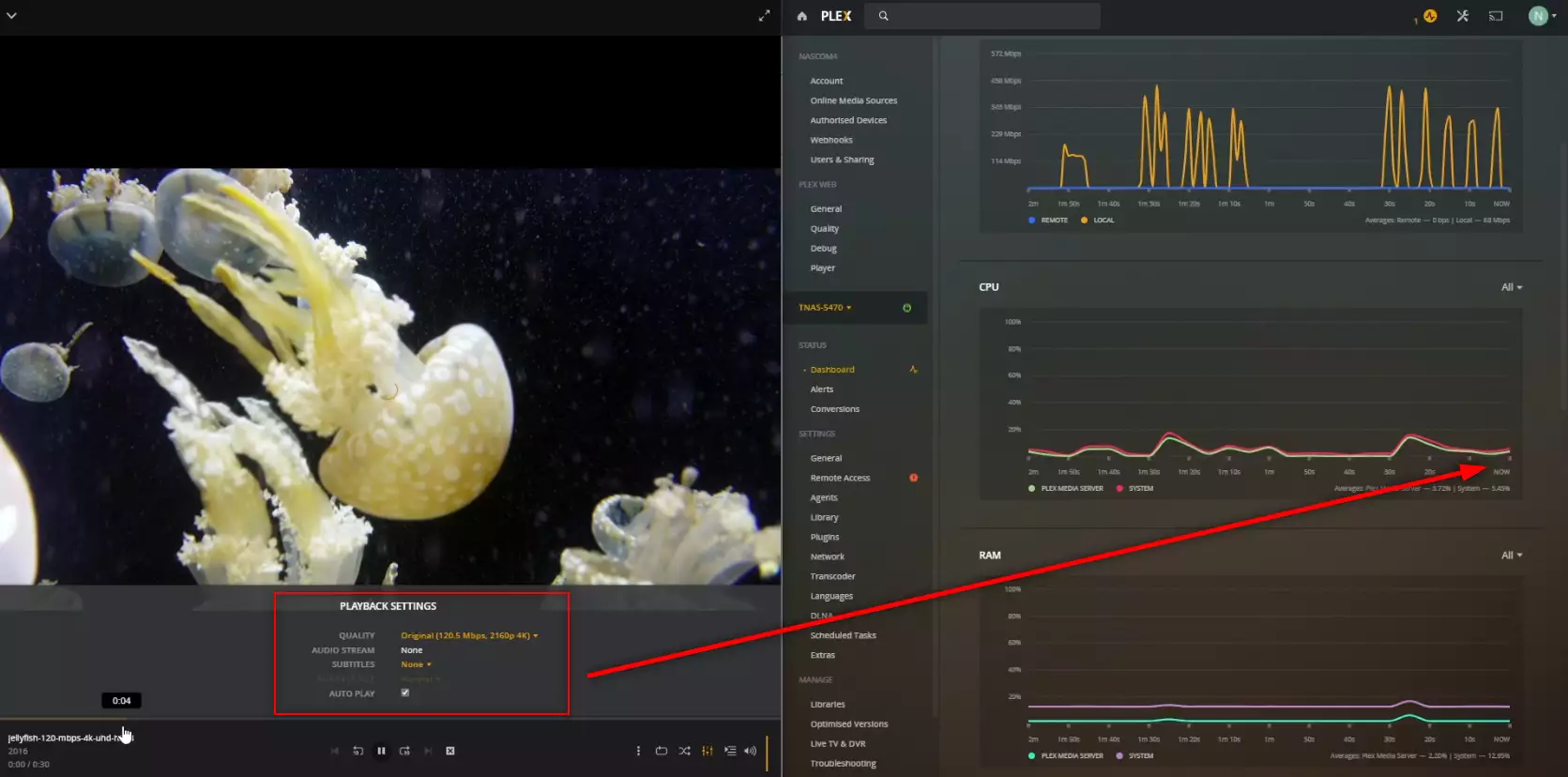
RESULT: FAIL AND-OR DID NOT PLAY
Extra Notes: None
Plex Test 14 – TERRAMASTER F4-423 Plex NAS – Jellyfish 4K 120Mbps H.265 – HEVC CONVERTED TO H.264
Here is how the TERRAMASTER F4-423 Plex NAS – Jellyfish 4K 120Mbps H.265 – HEVC CONVERTED TO H.264 File Performed:
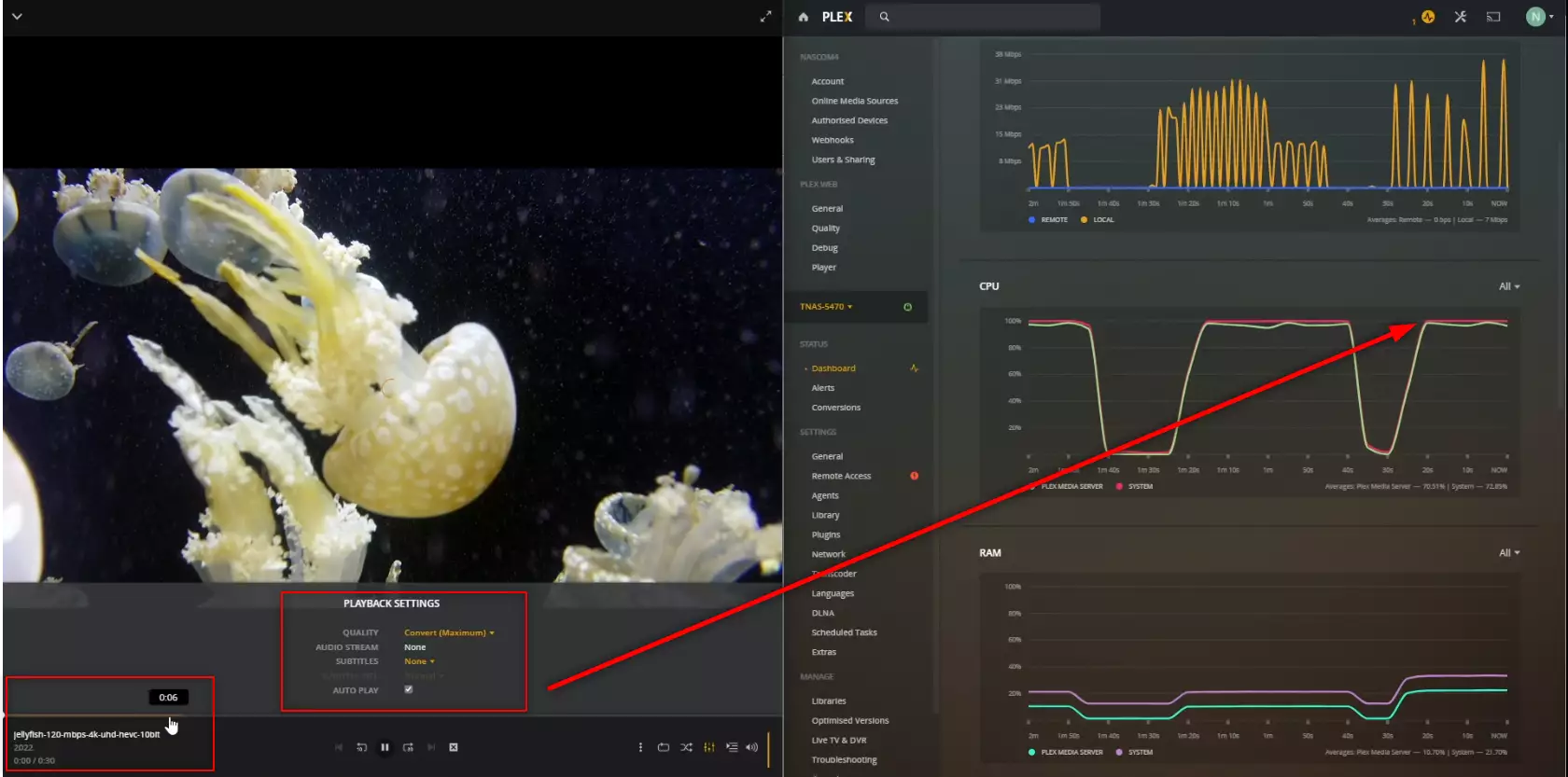
RESULT: FAIL AND-OR DID NOT PLAY
Extra Notes: None
Plex Test 15 – TERRAMASTER F4-423 Plex NAS – Jellyfish 4K 120Mbps H.265 – HEVC CONVERTED TO H.264 8Mbps 1080p
Here is how the TERRAMASTER F4-423 Plex NAS – Jellyfish 4K 120Mbps H.265 – HEVC CONVERTED TO H.264 8Mbps 1080p File Performed:
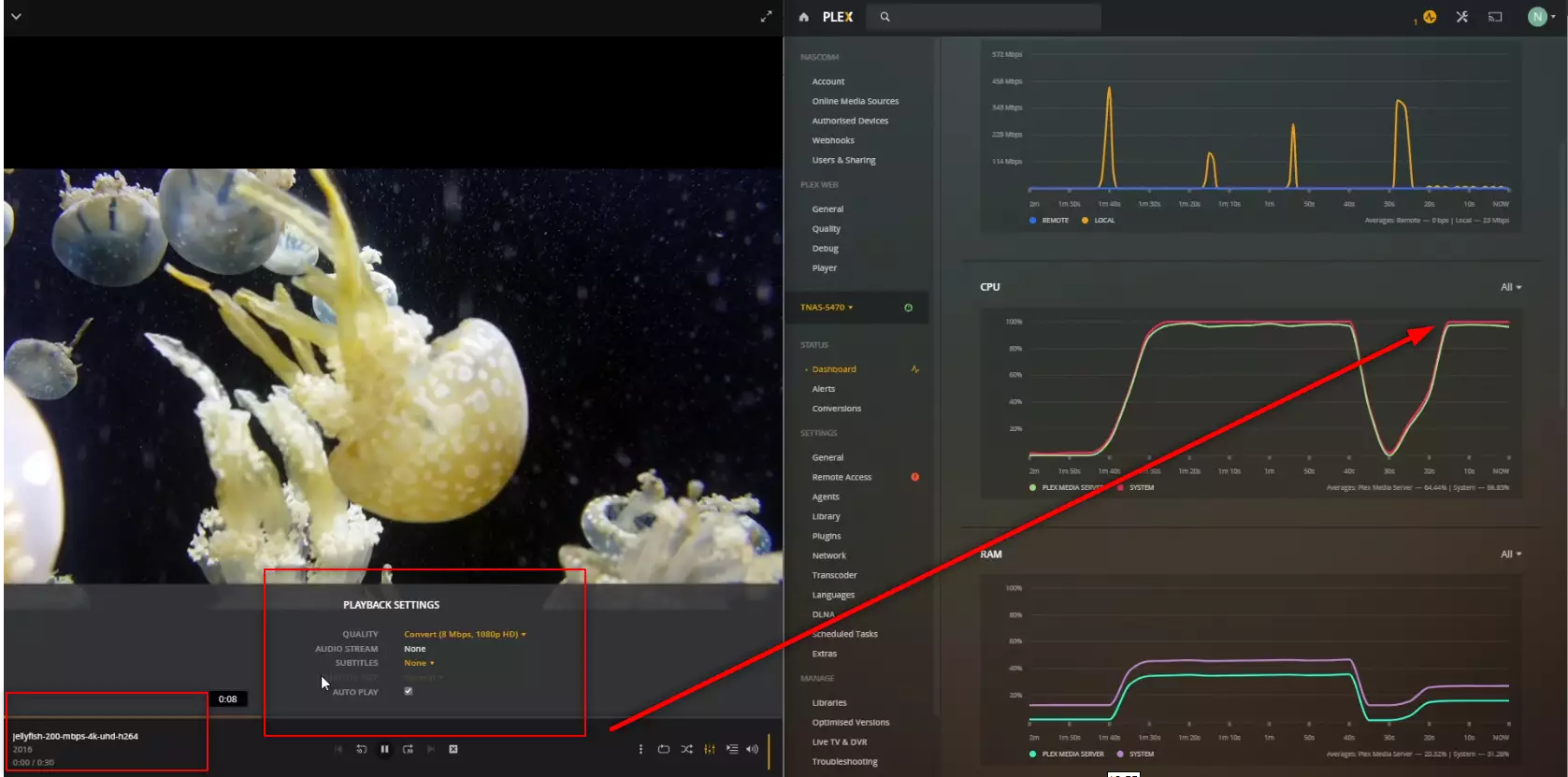
RESULT: FAIL AND-OR DID NOT PLAY
Extra Notes: None
Plex Test 16 – TERRAMASTER F4-423 Plex NAS – Jellyfish 4K 400Mbps H.265 10bit – HEVC CONVERTED TO H.264
Here is how the TERRAMASTER F4-423 Plex NAS – Jellyfish 4K 400Mbps H.265 10bit – HEVC CONVERTED TO H.264 File Performed:
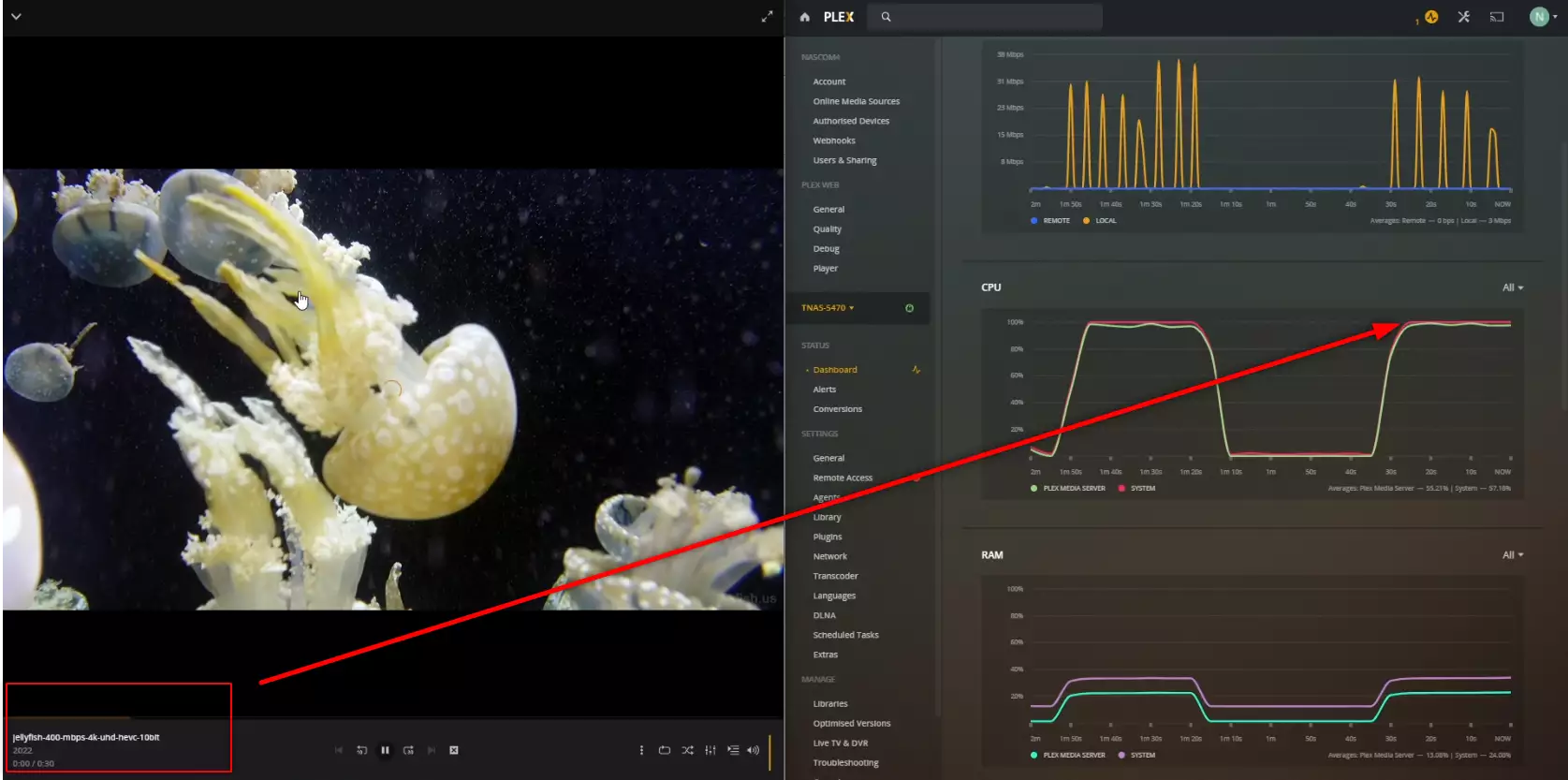
RESULT: FAIL AND-OR DID NOT PLAY
Extra Notes: Throughout the 4K Testing, the Terramaster F4-423 would regularly alert me that the CPU utilization was running unusually high. This was expected for these heavier processes, but I did want to give the Terramaster some kudos for alerting me (the administrator) taht this was occurring. Had I been running other processes at the same time as plex, this would have been detrimental to the running of the system.
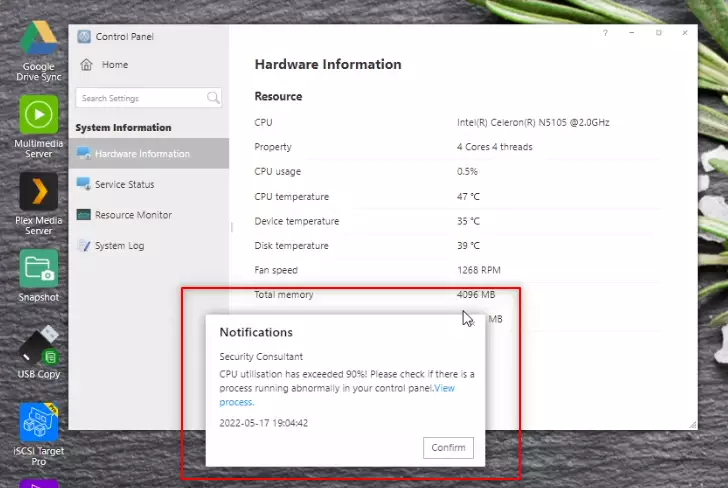
Is the Terramaster F4-423 NAS Any Good outside of Plex and Where Can I buy It?
If you are interested in learning more about the Terramaster F4-423 NAS Drive, I am pleased to confirm that the review here on NASCompares is already live and you can find out more about this device below.
Quick Verdict of the Terramaster F4-423 NAS – What We Said in the F4-423 Review:
Terramaster still continues to be the most affordable fully-featured provider of the whole NAS market and although a number of their solutions have always felt a little rough around the edges, you always got the impression that you were getting a good deal for the hardware that was available from QNAP and Synology. Now in 2022/2023, the same continues to be true but in the F4-423 NAS’ case, you are actually getting some pretty top tier (for the Home/Prosumer) market at a price tag that is really tough to argue with. Terramaster has clearly been watching their bigger competitors and cherry-picked the features that people have been asking for (2.5GbE, USB 3.2 Gen 2, M.2 NVMe SSD bays, etc) for this new generation. In terms of software, things are a little less convincing and although TOS 5 (currently in Beta at the time of writing) still continues to evolve into something genuinely fully featured and impressive, TOS 4 that the F4-423 includes at launch is usable (if unexciting) platform that provides the base level services that a new NAS user would want, but lacks killer apps that their competitors are offering right now (File Streaming, AI photo recognition, Surveillance, etc). Most of these ARE included in TOS5, but until it arrives much later in 2022 in a full release, the F4-423 feels like a powerful NAS that doesn’t have the software to show off its strengths yet. If you are reading this later in 2022 or 2023, this might well be irrelevant though, as the brand rolls out their bit firmware update to ALL Terramster NAS devices. Overall, I definitely CAN recommend the F4-423 NAS for its hardware, for Plex Media server or as an affordable multi-tier backup solution, but if you are looking for a NAS for more tailored data access or in a much more fully-featured package – hold out a little longer till TOS 5 gets released first.
Read the Rest of the Review HERE. Alternatively, you can find out the Pros and Cons below, as a few retailers that sell the Terramaster F4-423 NAS. Thanks for reading and if you need any further help choosing the right NAS for your Plex Media Server, use the free advice section linked below. Have a great week.
Where to Buy a Product





![]()
![]()

VISIT RETAILER ➤






![]()
![]()

VISIT RETAILER ➤






![]()
![]()

VISIT RETAILER ➤






![]()
![]()

VISIT RETAILER ➤
📧 SUBSCRIBE TO OUR NEWSLETTER 🔔
🔒 Join Inner Circle
Get an alert every time something gets added to this specific article!
This description contains links to Amazon. These links will take you to some of the products mentioned in today's content. As an Amazon Associate, I earn from qualifying purchases. Visit the NASCompares Deal Finder to find the best place to buy this device in your region, based on Service, Support and Reputation - Just Search for your NAS Drive in the Box Below
Need Advice on Data Storage from an Expert?
Finally, for free advice about your setup, just leave a message in the comments below here at NASCompares.com and we will get back to you. Need Help?
Where possible (and where appropriate) please provide as much information about your requirements, as then I can arrange the best answer and solution to your needs. Do not worry about your e-mail address being required, it will NOT be used in a mailing list and will NOT be used in any way other than to respond to your enquiry.
Need Help?
Where possible (and where appropriate) please provide as much information about your requirements, as then I can arrange the best answer and solution to your needs. Do not worry about your e-mail address being required, it will NOT be used in a mailing list and will NOT be used in any way other than to respond to your enquiry.

|
 |
Do MORE with Your M.2 Slots - GREAT M.2 Adapters!
5 Top Tips for Content Creators Buying a NAS
Terramaster F4 SSD NAS - Should You Buy? (Short Review)
Minisforum N5 Pro NAS Review - Did Minisforum just WIN at NAS?
What Can You ACTUALLY DO with HDMI on Your NAS?
Best NAS for under $499
Access content via Patreon or KO-FI


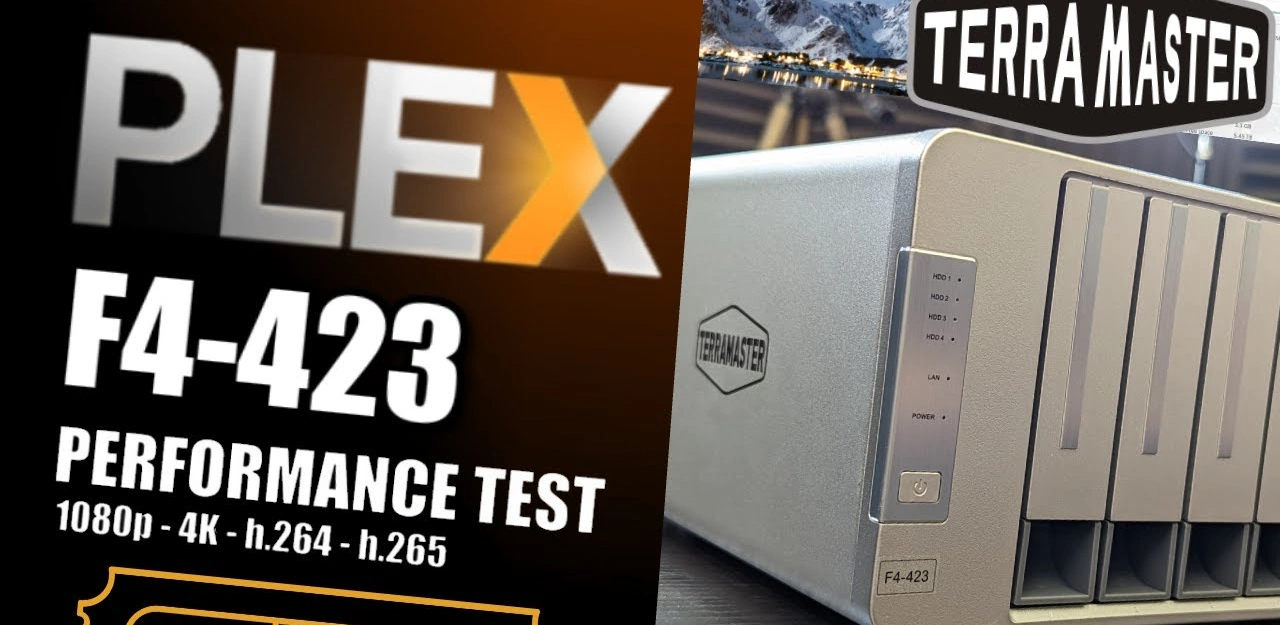
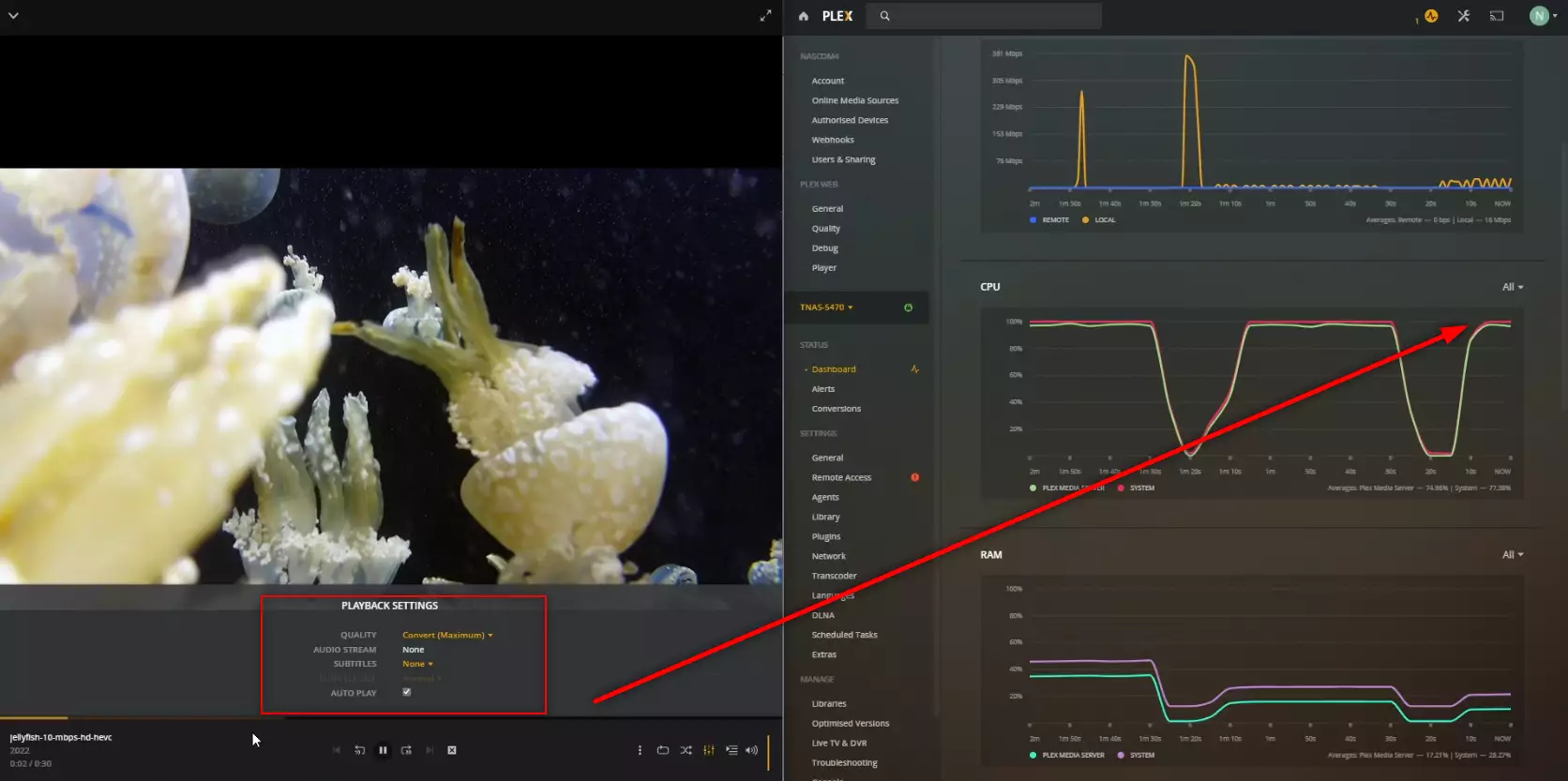



Hey guy, quick question is this Terramaster fast for transfering files back and forth from the pc to the nas because I had a drobo and it was horribly slow.
REPLY ON YOUTUBE
Hi I’m about to buy terrmaster on Amazon. Do I need to buy an extra 3 yr warrant with it or just buy the unit without warranty ????
REPLY ON YOUTUBE
Can you buy a HEVC licence for this NAS?
REPLY ON YOUTUBE
I love these types of NAS video testing. Personally I encode all my files just once to h.264 1280×720 @ CRF 20 and store those on my QNAP NAS for later playback. I use ffmpeg cli for encoding – or previously Handbrake -, this is a frontloaded pain to do but avoids the on the fly encoding problems demonstrated in this video.
REPLY ON YOUTUBE
I’ve got the Terramaster F4-210 and using Emby – it struggles with 4K video streaming and you answered my question why! Thank you. I’m using HEVC files. Gonna get h.264 4K files now. Never even realised about the whole licensing issues with HEVC
REPLY ON YOUTUBE
I currently have 2020 Mac Mini i7 6-core with 32GB Ram running my PLEX. I bought NAS DS1522+ for storage, but which should I use for Plex? My Mac or NAS. I think I play 4K footage no problem with my mac mini. I want to have enough resources to play any plex video and share to close ones
REPLY ON YOUTUBE
This was super helpful! Thank you!
REPLY ON YOUTUBE
Bought a used DS1019+ and love it! You helped with that decision so thanks!
REPLY ON YOUTUBE